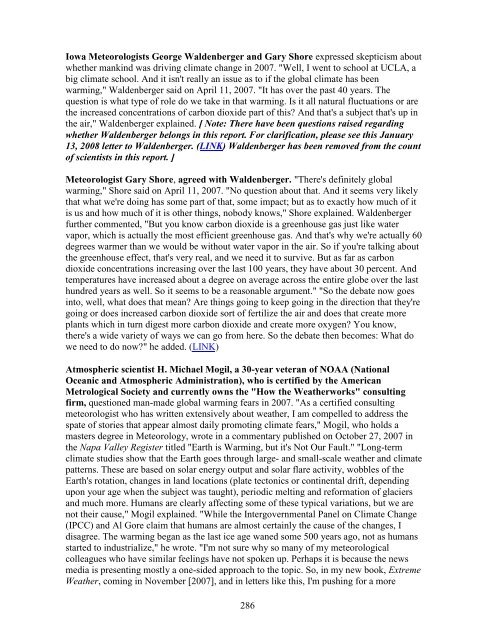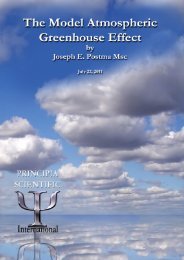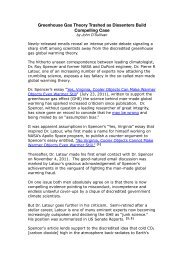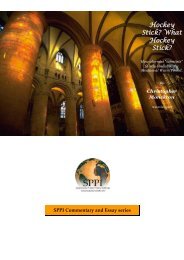Than 1000 International Scientists Dissent Over Man-Made Global ...
Than 1000 International Scientists Dissent Over Man-Made Global ...
Than 1000 International Scientists Dissent Over Man-Made Global ...
Create successful ePaper yourself
Turn your PDF publications into a flip-book with our unique Google optimized e-Paper software.
Iowa Meteorologists George Waldenberger and Gary Shore expressed skepticism about<br />
whether mankind was driving climate change in 2007. "Well, I went to school at UCLA, a<br />
big climate school. And it isn't really an issue as to if the global climate has been<br />
warming," Waldenberger said on April 11, 2007. "It has over the past 40 years. The<br />
question is what type of role do we take in that warming. Is it all natural fluctuations or are<br />
the increased concentrations of carbon dioxide part of this? And that's a subject that's up in<br />
the air," Waldenberger explained. [ Note: There have been questions raised regarding<br />
whether Waldenberger belongs in this report. For clarification, please see this January<br />
13, 2008 letter to Waldenberger. (LINK) Waldenberger has been removed from the count<br />
of scientists in this report. ]<br />
Meteorologist Gary Shore, agreed with Waldenberger. "There's definitely global<br />
warming," Shore said on April 11, 2007. "No question about that. And it seems very likely<br />
that what we're doing has some part of that, some impact; but as to exactly how much of it<br />
is us and how much of it is other things, nobody knows," Shore explained. Waldenberger<br />
further commented, "But you know carbon dioxide is a greenhouse gas just like water<br />
vapor, which is actually the most efficient greenhouse gas. And that's why we're actually 60<br />
degrees warmer than we would be without water vapor in the air. So if you're talking about<br />
the greenhouse effect, that's very real, and we need it to survive. But as far as carbon<br />
dioxide concentrations increasing over the last 100 years, they have about 30 percent. And<br />
temperatures have increased about a degree on average across the entire globe over the last<br />
hundred years as well. So it seems to be a reasonable argument." "So the debate now goes<br />
into, well, what does that mean? Are things going to keep going in the direction that they're<br />
going or does increased carbon dioxide sort of fertilize the air and does that create more<br />
plants which in turn digest more carbon dioxide and create more oxygen? You know,<br />
there's a wide variety of ways we can go from here. So the debate then becomes: What do<br />
we need to do now?" he added. (LINK)<br />
Atmospheric scientist H. Michael Mogil, a 30-year veteran of NOAA (National<br />
Oceanic and Atmospheric Administration), who is certified by the American<br />
Metrological Society and currently owns the "How the Weatherworks" consulting<br />
firm, questioned man-made global warming fears in 2007. "As a certified consulting<br />
meteorologist who has written extensively about weather, I am compelled to address the<br />
spate of stories that appear almost daily promoting climate fears," Mogil, who holds a<br />
masters degree in Meteorology, wrote in a commentary published on October 27, 2007 in<br />
the Napa Valley Register titled "Earth is Warming, but it's Not Our Fault." "Long-term<br />
climate studies show that the Earth goes through large- and small-scale weather and climate<br />
patterns. These are based on solar energy output and solar flare activity, wobbles of the<br />
Earth's rotation, changes in land locations (plate tectonics or continental drift, depending<br />
upon your age when the subject was taught), periodic melting and reformation of glaciers<br />
and much more. Humans are clearly affecting some of these typical variations, but we are<br />
not their cause," Mogil explained. "While the Intergovernmental Panel on Climate Change<br />
(IPCC) and Al Gore claim that humans are almost certainly the cause of the changes, I<br />
disagree. The warming began as the last ice age waned some 500 years ago, not as humans<br />
started to industrialize," he wrote. "I'm not sure why so many of my meteorological<br />
colleagues who have similar feelings have not spoken up. Perhaps it is because the news<br />
media is presenting mostly a one-sided approach to the topic. So, in my new book, Extreme<br />
Weather, coming in November [2007], and in letters like this, I'm pushing for a more<br />
286





